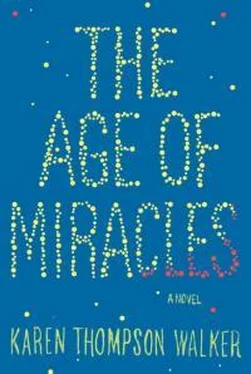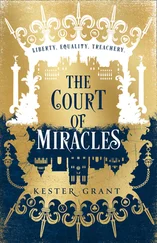“What’s a cleanse?” I said.
“It’s a fast,” said Sylvia.
She bent toward me to explain, and I heard my mother slide her flashlights behind her back. I think she was suddenly embarrassed by her fear.
“No food, no alcohol, just water. For three days. I’m sure your mother has done one before.”
My mother shook her head. “Not me,” she said. I was aware of my mother’s drink, sweating on the pavement beside her. For a moment nothing else was said.
“Anyway,” said Sylvia, beginning to walk away, “don’t let this stop you from practicing, Julia. See you Wednesday.”
Sylvia would spend the next few afternoons pruning roses in a sun hat and casually pulling up weeds.
“You know, it’s not healthy to be that skinny,” said my mother after Sylvia had gone back to her gardening. (My mother kept a closet full of dresses one size too small, all waiting in plastic, for the day when she lost the ten pounds she’d been complaining about for years.) “You can see her bones,” said my mother. And it was true: You could.
“Look,” I said. “The streetlights came on.”
Those lights were set to a timer, designed to ignite at dusk. But the sun continued to shine.
I imagined people on the other side of the world, in China and in India, huddling now in the darkness, waiting, like us—but for dawn.
“He should let us know he got to work safely, at least,” said my mother. She dialed again, waited, set the phone down.
I’d gone with my father to work once. Not much had happened while I was there. Pregnant women watched television and ate snacks in bed. My father asked questions and checked charts. Husbands milled around.
“Didn’t I ask him to call?” she said.
She was making me nervous. I tried to keep her calm.
“He’s probably just busy,” I said.
In the distance, I noticed that Tom and Carlotta, the old couple who lived at the end of the street, were sitting outside, too, he in a faded tie-dyed T-shirt and jeans, she in Birkenstocks, a long gray braid resting on her shoulder. But they were always out there at this time of night, beach chairs in the driveway, margaritas and cigarettes in their hands. Their garage door stood open behind them, Tom’s model train tracks exposed like guts. Most of the houses on our street had been remodeled by then, or fixed up, at least, given fresh veneers like old teeth, but Tom and Carlotta’s house remained untouched, and I knew from selling Girl Scout cookies that the original burgundy shag still lined their floors.
Tom waved at me, his hand thick with a drink. I didn’t know him well, but he was always friendly to me. I waved back.
It was October, but it felt like July: The air was summer air, the sky a summer sky, still light past seven o’clock.
“I hope the phones are working,” said my mother. “But they must be working, right?”
In the time since that night, I’ve developed many of my mother’s habits, the persistent churning of her mind on a single subject, her low tolerance for uncertainty, but like her wide hips and her high cheekbones, these were traits that would sleep dormant in me for some years to come. That night I could not relate to her.
“Just calm down,” I said. “Okay, Mom?”
Finally, the phone did ring. My mother answered it in a rush. I could tell she was disappointed by the voice she was hearing. She passed the phone to me.
It wasn’t my father. It was Hanna.
I stood up from the porch and walked out into the grass with the phone to my ear, squinting at the sun.
“I can’t really talk,” said Hanna. “But I wanted to tell you that we’re leaving.”
I could hear the voices of Hanna’s sisters echoing in the background. I could picture her standing in the bedroom she shared with them, the yellow-striped curtains her mother had sewn, the stuffed animals crowded on her bed, the hair clips spread out across the dresser. We had spent hours together in that room.
“Where are you going?” I asked.
“Utah,” Hanna said. She sounded scared.
“When are you coming back?” I asked.
“We’re not,” she said.
I felt a wave of panic. We’d spent so much time together that year that teachers sometimes called us by one another’s names.
As I would later learn, thousands of Mormons gathered in Salt Lake City after the slowing began. Hanna had told me once that the church had pinpointed a certain square mile of land as the exact location of Jesus’ next return to earth. They kept a giant grain silo in Utah, she said, to feed the Mormons during the end times. “I’m not supposed to tell you this stuff because you’re not in our church,” she said. “But it’s true.”
My own family’s religion was a bloodless breed of Lutheranism—we guarded no secrets, and we harbored no clear vision of the end of the world.
“Are you still there?” said Hanna.
It was hard to talk. I stood in the grass, trying not to cry.
“You’re moving away for good?” I finally said.
I heard Hanna’s mother call her name in the background.
“I have to go,” Hanna said. “I’ll call you later.”
She hung up.
“What did she say?” called my mother from the porch.
A hard lump had formed in my throat.
“Nothing,” I said.
“Nothing?” said my mother.
Tears rushed into my eyes. My mother didn’t notice.
“I want to know why Daddy hasn’t called us,” she said. “Do you think his phone is dead?”
“God, Mom,” I said. “You’re making everything worse.”
She stopped talking and looked at me. “Don’t be a smart-aleck,” she snapped. “And don’t say God .”
A slight static crackled through the radio speakers, and my mother adjusted the dial until it cleared. An expert from Harvard was talking: “If this keeps up,” he said, “this could be catastrophic for crops of all kinds, for the whole world’s food supply.”
We sat in silence for a moment.
Then from inside the house, we heard a quick thud, the wet smack of something soft striking glass.
We both jumped.
“What was that?” she said.
The unimaginable had been imagined, the unbelievable believed. Now it seemed to me that dangers lurked everywhere. Threats seemed to hide in every crack.
“It didn’t sound good,” I said.
We hurried inside. We hadn’t put anything away, and the kitchen was a mess. My bagel from the morning lay half eaten on a plate, exactly where I’d left it nine hours earlier, the cream cheese crusting at the edges. A container of yogurt had been overturned by the cats, its insides licked clean. Someone had left out the milk. I noticed that Hanna had left her soccer sweatshirt on a chair.
The source of the sound turned out to be a bird. A blue jay had struck a high window in our kitchen, then dropped to the back deck, its narrow neck apparently snapped, its wings spread asymmetrically around its body.
“Maybe it’s just stunned,” said my mother.
We stood at the glass.
“I don’t think so,” I said.
The slowing, we soon came to understand, had altered gravity. Afterward, the earth held a little more sway. Bodies in motion were slightly less likely to remain in motion. We were all of us and everything a little more susceptible to the pull of the ground, and maybe it was this shift in physics that had sent that bird straight into the flat glass of our windowpane.
“Maybe we should move it,” I said.
“I don’t want you touching it,” said my mother. “Daddy will deal with it.”
And so we left the bird exactly as it lay. We kept the cats inside for the rest of the night.
We left the kitchen as we’d found it, too. We’d remodeled it recently, and you could smell the paint in the air, but that chemical scent was mixing with the tinge of soured milk. My mother poured a fresh drink: Two new ice cubes cracked and resettled beneath a stream of sparkling Scotch. I’d never seen her drink so much in one day.
Читать дальше












